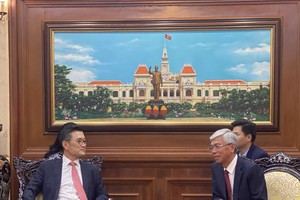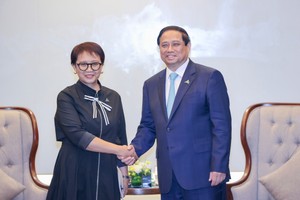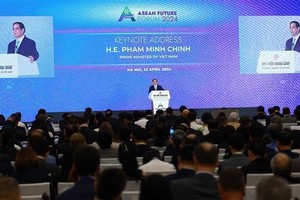Kosovo inched closer to a widely expected declaration of independence on Sunday, amid rising political tension and Serbia's determination to resist what it considers an illegal breakaway.

Kosovo Prime Minister Hashim Thaci refused Friday to say exactly when independence would come, but both Belgrade and the international community visibly stepped up their preparations.
In Belgrade, Serbian President Boris Tadic vowed to do everything to keep Kosovo within Serbia, as he was sworn in for a second term in office Friday.
In Kosovo's capital Pristina, freshly printed posters appeared on the streets appealing for calm during celebrations -- including street parties -- that will herald independence in the mostly ethnic Albanian province.
"Celebrate with dignity," read the posters, illustrated simply with a bright red heart. "For a good start. For Kosovo. Kosovo welcomes the future." The same message was also carried on local television channels.
The Bota Sot newspaper said Kosovo legislators had been ordered to stay close to Pristina on Sunday and to be prepared for the Kosovo parliament to be convened at three hours' notice.
Asked at a press conference Friday in Pristina on which date the split would come, Thaci replied: "Let's stick to what the press conference is about" -- namely, a personal pledge to uphold minority Serb rights.
"In independent Kosovo, not one citizen will feel discriminated against or neglected," he said in Albanian. "We guarantee equal rights and security. Kosovo is the homeland of all citizens."
In the divided northern city of Kosovska Mitrovica, however, local Serb leaders who reject independence said they had accepted a proposal from Belgrade to form their own parallel parliament in response to independence.
More than 220,000 Serbs have fled the province since the end of the Kosovo war in 1999 when NATO bombing ended a clampdown by Serb forces against separatist ethnic Albanian rebels.
Kosovo's break is backed by the main EU powers and the United States, while Serbia's position is strongly supported by Russia.
The European Union is to start sending a 2,000-strong force of police and legal experts imminently to smoothen the transition to independence.
Independence for Kosovo would close the chapter on United Nations administration in Kosovo that began in 1999 after the NATO campaign against then Serbian leader Slobodan Milosevic.
But the impending split has stoked nationalist fervour in Serbia.
"I want clearly to confirm: I will never give up the fight for our Kosovo and, with all my strength, I will fight for Serbia to be in the European Union," said Tadic as he took his presidential oath Friday.
Belgrade and Moscow have stated that any declaration of independence would be "null and void" and a violation of international law -- a point they made at a closed-door meeting of the UN Security Council on Thursday.
In Madrid meanwhile, the authorities summoned the Russian ambassador Friday after Putin likened the situation in Kosovo to Spain's Basque and Catalan regions, said a Spanish foreign ministry source.
"What's the use of encouraging separatism?" Putin told reporters in Moscow.
"People don't want to live in a Spain in the heart of single state. Well, let's support them then!" he added, a reference to the separatist movements in Spain northern Basque Country and eastern region of Catalonia.
Madrid, which is is hostile to the idea of unilateral independence for Kosovo, expressed its "surprise" at Putin's remarks to Moscow's ambassador and called for an explanation, said the ministry source.
The armed separatist group ETA is blamed for the deaths of 819 people in Spain during almost four decades of fighting for independence for the Basque region.
























